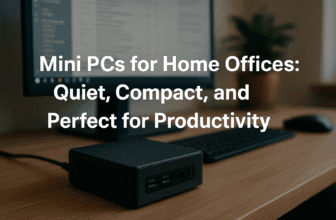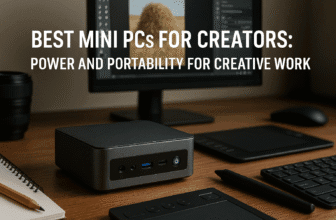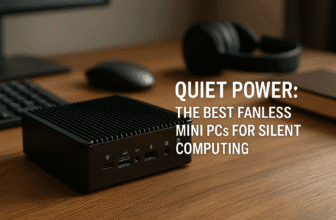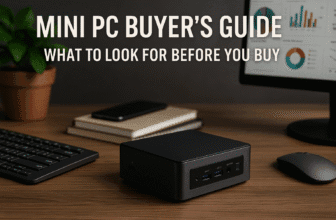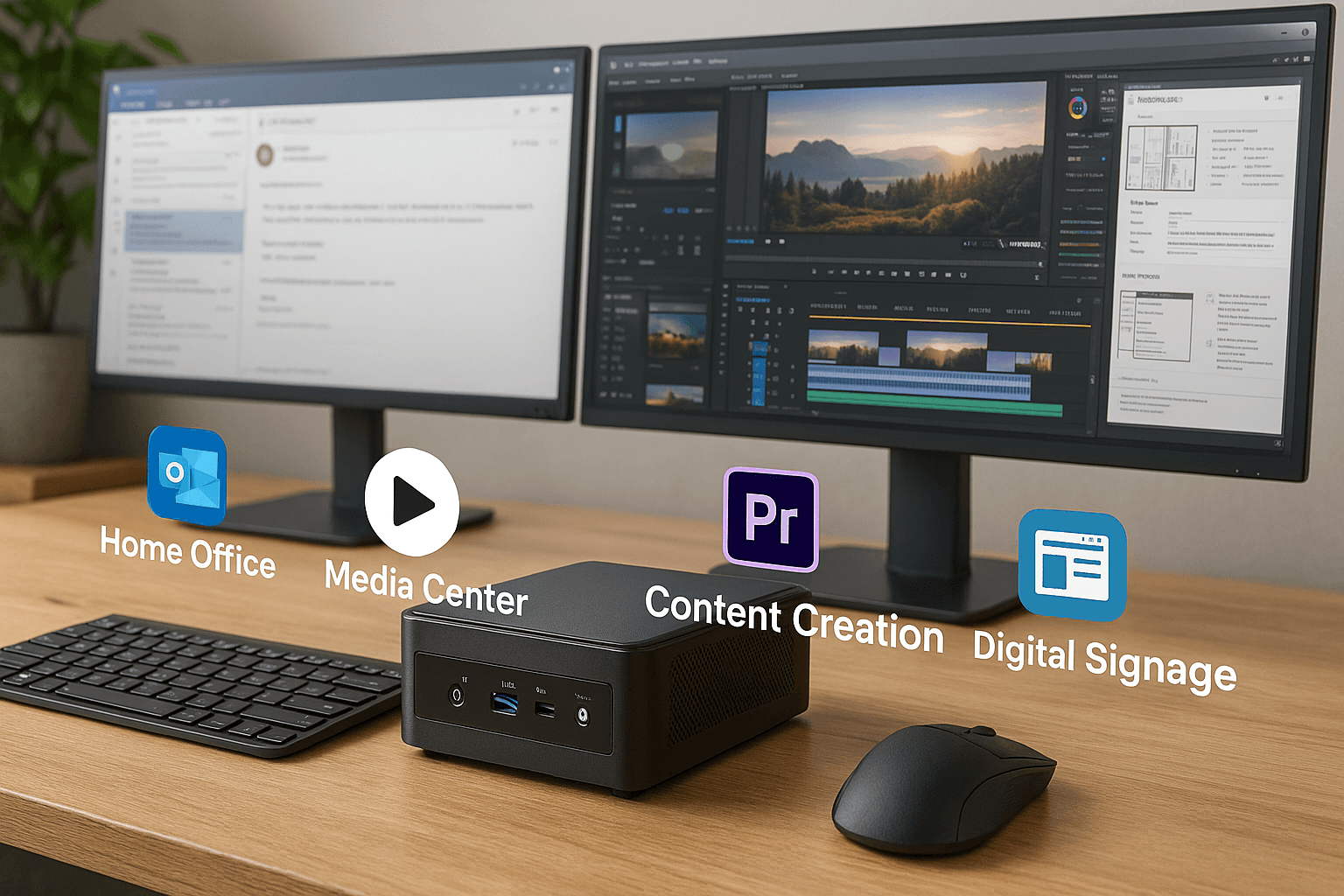
Introduction: Small Size, Massive Potential
Mini PCs are redefining how we think about computing. These compact powerhouses, once considered niche or underpowered, have evolved into versatile solutions for a wide range of use cases—from powering home offices to managing enterprise workloads, digital signage, smart classrooms, and more.
Whether you’re a student, remote worker, small business owner, or IT administrator, there’s a high-performance mini PC out there that can meet your needs. With enhanced power efficiency, modern CPUs, quiet operation, and the ability to connect to multiple displays and peripherals, mini PCs have become one of the most adaptable computing solutions on the market.
This article explores the top real-world use cases for mini PCs, including the hardware requirements, software pairings, and ideal user profiles for each scenario.
1. Home Office Workstations
✅ Best For: Remote professionals, freelancers, students
Mini PCs are a dream come true for remote workers and at-home productivity enthusiasts. Their small footprint means you can set them up anywhere—on a shelf, behind a monitor, or on a compact desk.
Common Tasks:
- Email, document editing, spreadsheets
- Web conferencing (Zoom, Teams, Meet)
- Light design work or project management tools
Ideal Specs:
- CPU: Intel i5 / AMD Ryzen 5 or higher
- RAM: 16GB for multitasking
- Storage: 512GB SSD
- OS: Windows 11 or Ubuntu
Why It Works: Quiet operation, energy efficiency, and reliable performance for full workdays.
2. Media & Entertainment Centers
✅ Best For: Home theaters, casual gamers, streaming setups
Turn your living room into a streaming powerhouse with a mini PC that handles 4K video playback, local media servers, and light gaming with ease.
Use Cases:
- Streaming platforms: Netflix, YouTube, Plex, Kodi
- Emulation and retro gaming
- HTPC (Home Theater PC) environments
Ideal Specs:
- CPU: Intel i5+ / Ryzen 5+ with integrated GPU or NVIDIA RTX 3050
- RAM: 8–16GB
- Storage: 1TB HDD + 256GB SSD for OS
- OS: Windows 11 Home, Linux Mint, or SteamOS
Why It Works: HDMI 2.1 support, ultra-quiet fans, and compact chassis perfect for media consoles.
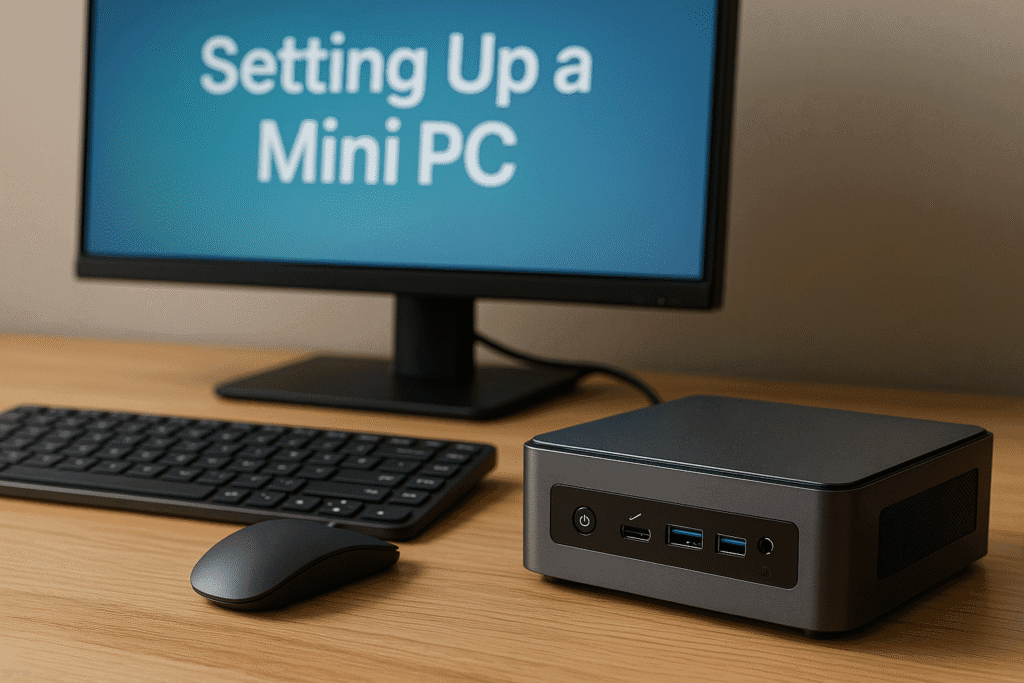
3. Content Creation Studios
✅ Best For: Designers, video editors, digital artists
Mini PCs can handle serious creative workloads in 2025, including 4K video editing, music production, and digital illustration—especially when paired with eGPUs or models with discrete GPUs.
Software Pairings:
- Adobe Creative Cloud (Premiere Pro, Photoshop)
- DaVinci Resolve
- Blender, FL Studio, Affinity Suite
Ideal Specs:
- CPU: Intel i7/i9 or Ryzen 7/9
- GPU: NVIDIA RTX 4060 or AMD RX 7600
- RAM: 32GB+
- Storage: 1TB NVMe SSD
- OS: Windows 11 Pro or macOS (for Mac Mini M3 Pro)
Why It Works: High-speed ports (Thunderbolt 4), external GPU compatibility, and multi-monitor support.
4. Educational & Classroom Environments
✅ Best For: Digital learning labs, STEM classrooms, remote learning kits
Mini PCs are affordable and easy to manage, making them perfect for deploying in classrooms, especially with education-focused OS options like ChromeOS Flex or Linux.
Advantages:
- Centralized IT control
- Low power draw = lower school utility costs
- Small footprint = more room for collaboration and learning
Ideal Specs:
- CPU: Intel Celeron / Pentium / AMD Ryzen 3 for budget builds
- RAM: 8GB
- Storage: 128–256GB SSD
- OS: ChromeOS Flex or Linux Mint
Why It Works: Inexpensive to maintain, remotely manageable, and ideal for browser-based tools like Google Classroom.
Note: Avoid These Common Mistakes When Buying a Mini PC
- Prioritizing Price Over Performance: A lower price tag might seem attractive, but it often leads to underpowered systems that can’t handle modern workloads.
- Neglecting Connectivity Needs: Always check for the number and type of ports available. Limited USB-C or HDMI ports can limit your workflow.
- Not Considering Upgradeability: Some mini PCs cannot be upgraded later. Choose models that let you add more RAM or storage as your needs grow.

5. Digital Signage & Kiosks
✅ Best For: Retail displays, hotel check-in stations, museum guides, menu boards
Mini PCs provide a powerful, low-profile solution for businesses needing responsive and easily updatable displays.
Deployment Scenarios:
- Interactive kiosks
- Advertising billboards
- Public information terminals
- Restaurant menu screens
Ideal Specs:
- CPU: Intel i3/i5 or ARM-based system
- RAM: 4–8GB
- Storage: 64GB SSD (cloud-synced)
- OS: Linux, Windows 11 IoT, or Android-based systems
Why It Works: Reliable 24/7 uptime, small size for hidden installs, low maintenance.
6. Virtualization and Network Appliances
✅ Best For: Tech enthusiasts, sysadmins, small business IT
Mini PCs can run virtualization software like VMware, Proxmox, or VirtualBox for testing environments, VPN servers, NAS devices, and more.
Common Uses:
- Firewall/router (e.g., pfSense or OPNsense)
- Private cloud storage (Nextcloud, TrueNAS)
- Developer sandbox or CI/CD environment
Ideal Specs:
- CPU: Intel i7+ / Ryzen 7+ (with VT-x or AMD-V)
- RAM: 32–64GB
- Storage: Dual NVMe + HDD (RAID recommended)
- OS: Linux, Proxmox, FreeBSD
Why It Works: Compact enough to run silently in network racks or server rooms while offering full server functionality.
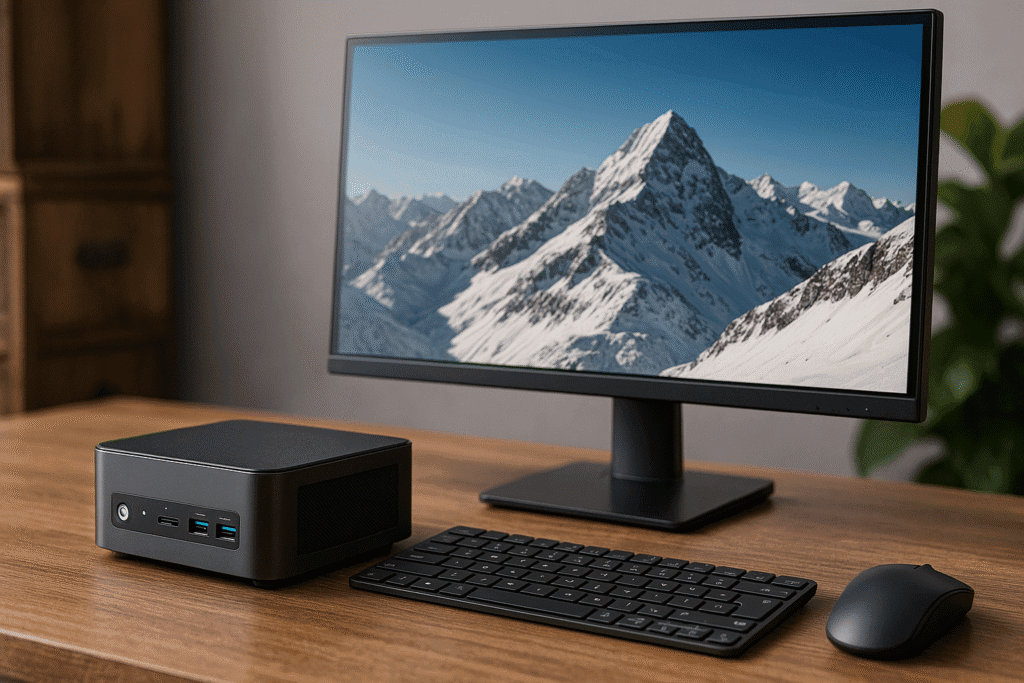
7. Point-of-Sale (POS) Systems
✅ Best For: Retail shops, restaurants, event venues
Mini PCs are a smart and secure POS solution when paired with touchscreen monitors, scanners, receipt printers, and inventory systems.
POS Software Compatibility:
- Square POS, Lightspeed, Toast, Vend, or Shopify
- Windows and Android versions of payment apps
- Custom ERP dashboards
Ideal Specs:
- CPU: Intel Celeron / i3
- RAM: 8GB
- Storage: 128GB SSD
- OS: Windows 11 IoT or Linux
Why It Works: Long-lasting hardware, secure data processing, and ease of integration with peripherals.
8. AI Edge Computing and Robotics
✅ Best For: Researchers, industrial engineers, AI developers
Edge computing has exploded in 2025, and mini PCs are now capable of processing data locally with high efficiency. Think machine vision, smart automation, or robotics control.
Deployment Examples:
- Smart manufacturing automation
- IoT hubs
- Robotics labs
- Surveillance AI and motion detection
Ideal Specs:
- CPU: Intel i7+ or ARM-based processors
- GPU: NVIDIA Jetson, RTX A2000 or equivalent
- RAM: 16GB+
- OS: Ubuntu, ROS (Robot Operating System), or custom Linux builds
Why It Works: Mini PCs reduce latency by processing locally rather than relying on the cloud—vital for real-time AI tasks.
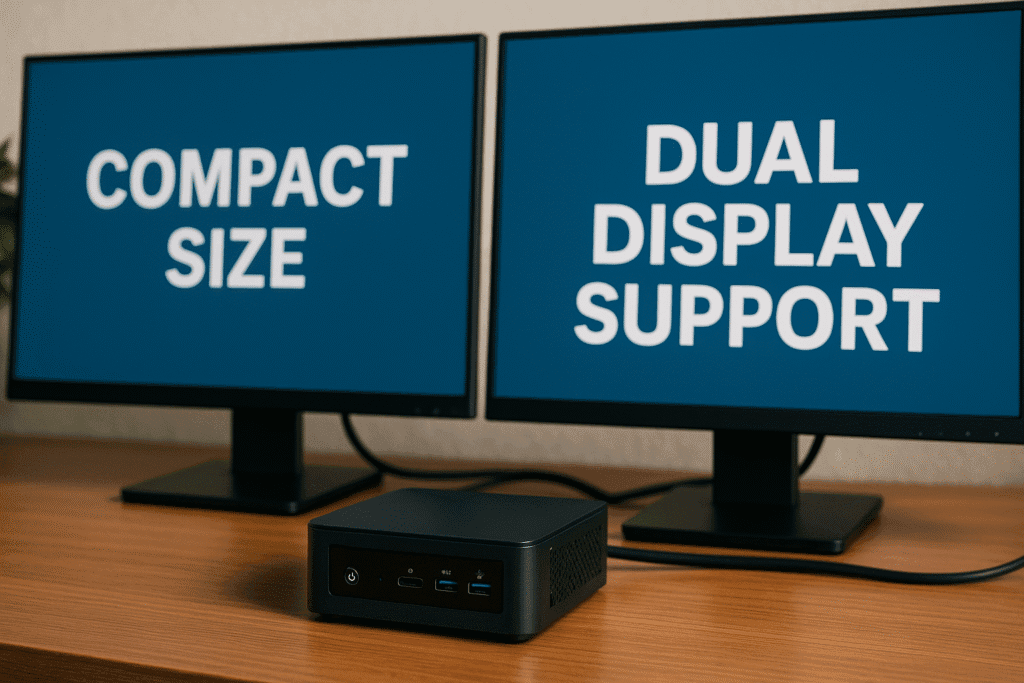
9. Travel-Friendly Portable Workstations
✅ Best For: Digital nomads, consultants, field techs
Mini PCs can replace bulky laptops for those who travel with monitors and peripherals, offering full desktop power with reduced space and weight.
Travel Use Cases:
- Photography & video editing on the go
- Field data processing
- Secure remote work (VPN + encrypted storage)
- IT deployment kits
Ideal Specs:
- CPU: Ryzen 7 / Intel i7 mobile-class or better
- RAM: 16GB+
- Storage: 512GB SSD
- OS: Any—often dual-boot Windows + Linux
Why It Works: Fits in carry-on bags, weighs under 2 lbs, and plugs into hotel TVs or portable monitors.
10. Smart Home Hubs and Automation Servers
✅ Best For: Home automation enthusiasts
With open-source platforms like Home Assistant and OpenHAB, mini PCs offer more power and control than typical smart hubs like Alexa or Google Home.
Features Supported:
- Automate lights, HVAC, locks, and cameras
- Manage Zigbee/Z-Wave devices
- Host local voice assistants (e.g., Mycroft AI)
Ideal Specs:
- CPU: Intel N100 / Ryzen 3+
- RAM: 4–8GB
- Storage: 64–128GB SSD
- OS: Linux or Home Assistant OS
Why It Works: Secure, customizable, and not reliant on cloud services.
Final Thoughts: Small Form Factor, Big Possibilities
Mini PCs in 2025 are no longer limited to basic tasks. They’re powering everything from creative studios and edge AI processing to network infrastructure and POS terminals. Their energy efficiency, space-saving design, and scalable performance make them one of the most versatile technologies of the decade.
👉 Call to Action: Looking for a flexible and future-proof computing solution? Discover the ideal mini PC for your specific use case and start simplifying your workflow—without sacrificing performance.

I am a USMC Veteran who worked with a Lot of computers and Technology while I was in. I became hooked and learned a lot in my 20 years. At my store, I am passionate about bringing you the latest tech products that enhance your everyday life. Our mission is to provide quality, innovation, and value, making sure you find the perfect gadgets to fit your needs. Thanks for Your Support.. Larry Mac

